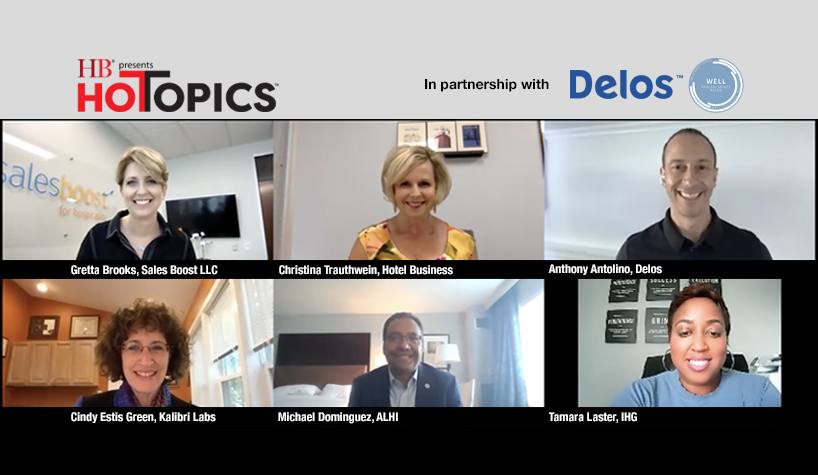During the latest edition of Hot Topics, “Planning Ahead: A Return to Meetings Business,” with sponsor support from Delos, panelists discussed business travel—when it will return and how it will change post-pandemic.
Moderated by Christina Trauthwein, Hotel Business’ VP of content and creative, the group of panelists included Anthony Antolino, chief commercial officer, Delos; Gretta Brooks, founder/CEO, SalesBoost LLC; Michael Dominguez, president/CEO, ALHI; Cindy Estis Green, CEO/cofounder, Kalibri Labs; and Tamara Laster, VP, global sales strategy, IHG.
Estis Green opened the session with the most recent statistics and forecasts on business travel.
“The groups and meetings—and the whole commercial end of the business—has, as everybody knows, has been a more delayed recovery; it’s started finally, but there’s been limitations,” she said. “Some of the larger corporate accounts have restricted their budgets for this year, so we anticipate next year will be much better. We were down 64% in commercial business through the COVID period, which is pretty substantial. Just to give some context, in 2019, the commercial business was 53% of guest-paid revenue, and the leisure business was 47%. But of the group business, two thirds of it is commercial, so when that goes away, that’s kind of a big chunk of the business.”
Leisure declined also during COVID, she reported, but only by about 47%. “So, we’ve seen the leisure business come back already; by the end of May and June, we’ve been at or above, 2019 levels. For commercial business, we’re still down by about 49%. It is a gradual return and our forecast has the commercial side getting back by the end of ’22, to something like 80% of the transient levels. Group business will take a little bit longer (there’s going to be obviously big differences based on size of group), but somewhere between 60% and 70% by the end of ’22.”
Brooks pointed out that the small to midsize companies are “running to travel,” adding, “They’re trying to travel quickly because there’s a competitive environment out there—they want to be first, they want to be in their customer space to build those relationships. The reason for traveling, whether it’s corporate or for meetings, first and primary is sales and really getting out there and building those relationships, so being focused on providing resources for sales meetings and internal meetings will be really the hot topics and where we need to focus our energy and our efforts.”
Dominguez offered some advice to hoteliers with a hockey reference—”As an industry, we need to be skating to where the puck is going to be, not where the puck is”—and offered some optimistic statistics from his company’s sales efforts.
“We are seeing the smaller companies in the short term if you’re looking at 2021, but we’re seeing for 2022, we got to 92% of unique lead levels of 2019 in June,” he said. “To give you some perspective, we went from 400 in January to 1,600 in June. It is a massive increase, and every month it’s been increasing by 25% to 30%. What’s more important is we booked about $31 million of total future business, and it was $31.9 million in 2019 for June. We already see the big stuff coming back into ’22.”
He pointed out that the numbers should be high for most because of the compression of the meeting space. “We took three years worth of meetings, crushed them into two years and now we’re getting into normal booking cycles of 18 to 24 months,” he noted. “Will it come back? It’s already here; what we are finding is everywhere that we are meeting, we are blowing through our attendance numbers. That’s problematic for the meeting planners because they’re being conservative with their contracts and their room blocks, and then they’re blowing through them. The hotels have such leisure demand and other business in there, they can’t move the blocks. We’re already starting to find that that’s a good problem to have.”
For Laster, an important part of the return of the group and meetings business will be making sure that meeting planners and attendees understand what they will encounter when they get to the hotel, as well as what has been done to keep them healthy and safe.
“All of us in the supplier industry have some sort of cleanliness protocol,” she said. “The key is going to be managing the attendee expectation around what to expect in their group or meetings. Being able to deliver an amazing group or meeting starts with the planners managing expectations, understanding where the meeting is taking place, what the protocols are from a local perspective in terms of the restrictions, how they’re handling mask mandates and all of those different things like social distancing and making sure the attendees are aware of that.”
Antolino agreed with Laster, noted, “As the pandemic recedes, and people are out traveling more for business, doing meetings, having those dinners again, building those relationships again, rekindling those relationships and forming new relationships, it’s really mission critical for the hotels to be able to communicate what has been done to really just give peace of mind.”
He pointed out that “Delos cares a lot about how the environment affects the human condition in the spaces we spend our time,” and added that there are products to improve indoor air quality that are “cost effective, portable and real simple to implement that have high impact, and they are a visual cue that a measure has been taken.”
Look for more coverage on this Hot Topics webinar in the Sept. 15 issue of Hotel Business.
